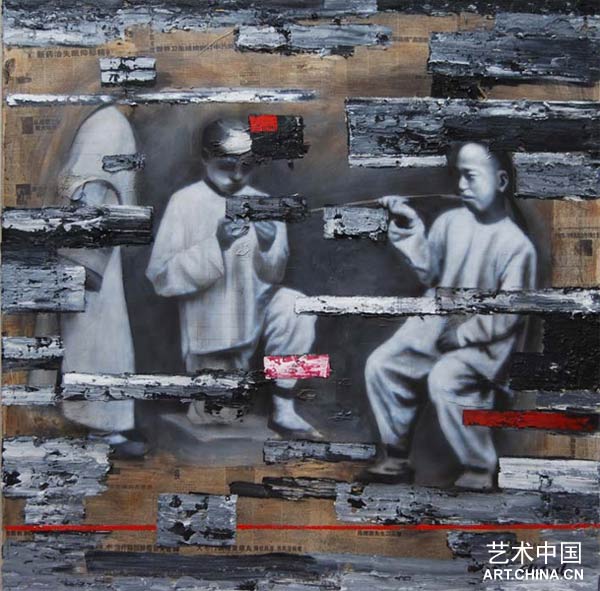
FRAGMENTS
Oil paintings of Gao Zengli
懸幻時(shí)空——高増禮
2008年11月5日﹣11月28日
精藝軒畫廊
香港中環(huán)嘉咸街35-39號(hào)嘉豪大廈地下三號(hào)鋪
歡迎蒞臨 開(kāi)幕酒會(huì)
2008年11月5日(星期三)下午6時(shí)至8時(shí)
藝術(shù)家將在現(xiàn)場(chǎng)暢談創(chuàng)作心得
November 5th – 28th, 2008
Art Beatus Gallery
35-39 Graham Street, G/F, Central, Hong Kong
Please come & meet the artist
on November 5th (Wed.) 2008, from 6-8pm

看高増禮的畫就好像在探視著他的記憶中的片段,和在看懸掛于他的內(nèi)心的幻覺(jué);他的作品似在畫歷史人物如溥儀與毛澤東等,但實(shí)質(zhì)上這些人物只是他的藝術(shù)創(chuàng)作的符號(hào)而已。
高増禮于一九六四年生于甘肅蘭州,畢業(yè)于山東工藝美術(shù)學(xué)院及巴黎國(guó)立美術(shù)學(xué)院。近年間,他工作及生活于巴黎與北京兩地,就是因?yàn)橐硖幖斑m應(yīng)兩處不同的環(huán)境,使他越來(lái)越注重作為中國(guó)人的身份和中國(guó)文化及清楚地認(rèn)識(shí)到中國(guó)文化與傳統(tǒng)的深厚力量,促使他更了解自我的構(gòu)成。
他表示喜歡從歷史的角度去思考藝術(shù),因他的畫中人物都是立體的,例如溥儀這個(gè)重要?dú)v史人物,有著千絲萬(wàn)縷的背景資料,在他的畫中這位未代皇帝被符號(hào)化了。高增禮嘗試用他的作品打開(kāi)踏進(jìn)中國(guó)近代史的大門。
高増禮 說(shuō):「我喜歡黒暗的氛圍,用黒色和灰色進(jìn)行闡釋,黒白色彩的搭配折射出歷史的追憶,因?yàn)槲蚁M诤诎抵袑ふ谊?yáng)光。」他把自己懸于藝術(shù)創(chuàng)作的邊緣境界中,認(rèn)為藝術(shù)創(chuàng)作如果完全投進(jìn)了現(xiàn)時(shí)的主流趨勢(shì),則會(huì)喪失其純粹性和獨(dú)立性;他認(rèn)為游走于邊緣是一種危險(xiǎn)的選擇,但卻使藝術(shù)成為藝術(shù);因此,他情愿選擇留在「灰色地帶」,讓自己處身于懸幻時(shí)空間。
For enquiry, please e-mail us at dyiu@artbeatus.com.hk or call 2522-1138 / 2526-0818
Gallery hours: Mon.-Sat. 11:30am to 7:30pm, close on Sundays & public holiday
畫廊開(kāi)放時(shí)間:星期一至六 11:30am-7:30pm 星期日及公眾假期休息
The paintings of Gao Zengli are fragments of his memories reconstructed. They are illusory imageries suspended in his mind. What, visually, appear like portraits of some famous personalities such as the last Emperor of the Qing Dynasty, Pu-yi, and Chairman Mao are, in fact, mere symbols employed by Gao for his artistic expression.
Born in Lanzhou, Gansu Province in 1964, Gao finished his art training in the Shandong Academy of Fine Art and later in the National Academy of fine Art in Paris, France. In recent years, he splits his time working between Paris and Beijing. The dissimilarity of the life-style of these two cities has coerced him to put in proper prospective the question of identity as well as deepening his appreciation of the Chinese culture.
Gao loves to deploy his art from a historical standpoint, as the figures whom he has used in his works usually bring with them specific values, experiences, sentiments as well as contrasting feelings. Using characters such as Pu-yi, Mao and Deng Xiaoping as his symbols, Gao hopes to tap into the reservoir of emotions embedded in the modern history of China.
“I like the environs of darkness and express myself in black and grey colours. The grey scale between black and white is useful in reflecting memories of the past as I strive to discover sunshine amidst darkness,” he commented.
|

